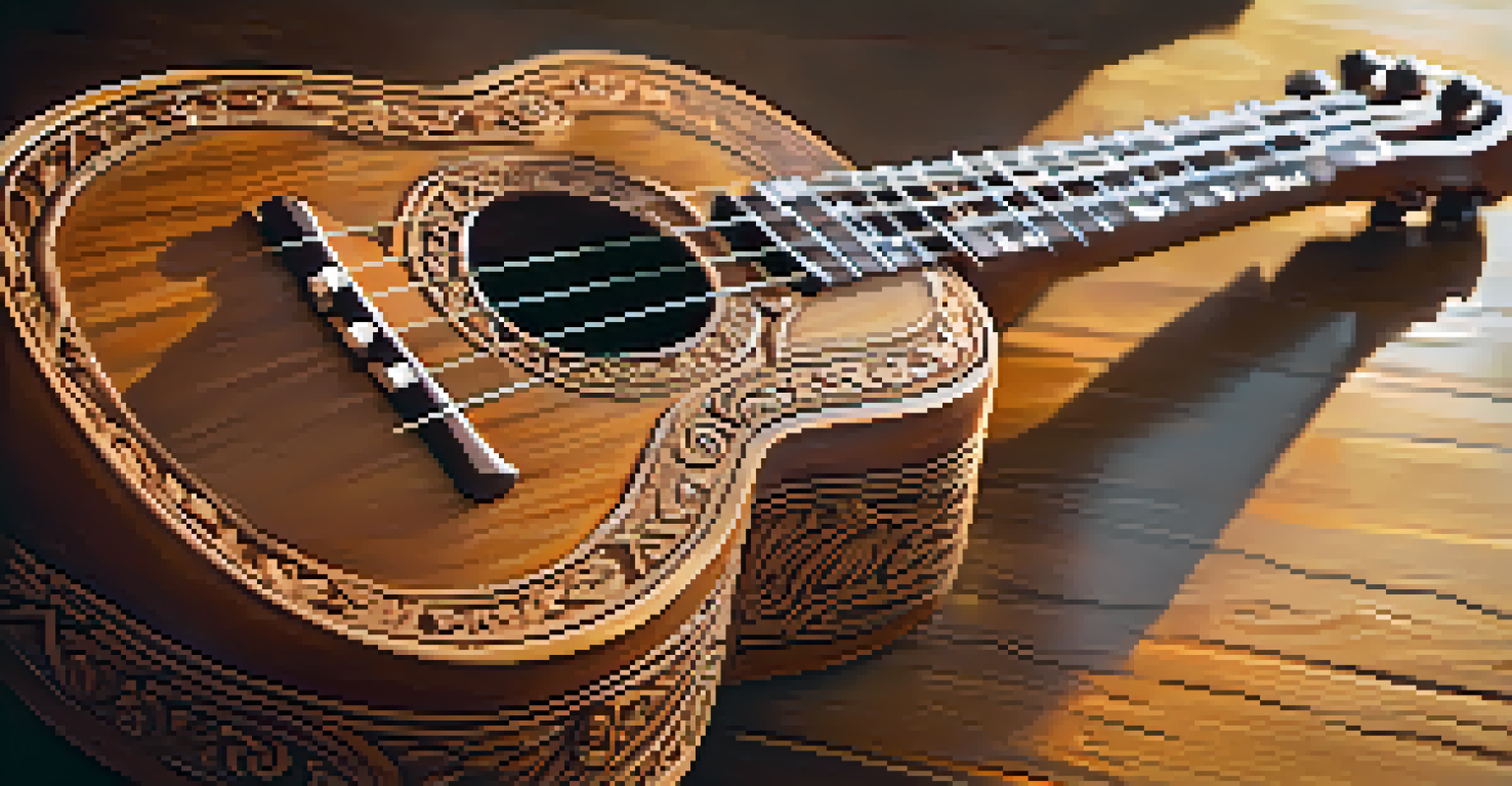The Role of Ukulele in Hawaiian Culture and Music

The Ukulele: A Symbol of Hawaiian Identity
The ukulele is more than just a musical instrument; it's a symbol of Hawaiian identity. Originating from Portuguese immigrants in the 19th century, it quickly became embraced by the local culture. Today, it serves as a reminder of the islands' rich history and the blending of cultures that characterize Hawaii.
The ukulele is a bridge between cultures, connecting people through music and shared stories.
For many Hawaiians, playing the ukulele is a way to connect with their heritage. It's common to see families gathered around, strumming the instrument and sharing stories through song. This communal aspect emphasizes the importance of music in Hawaiian life, fostering a sense of belonging and cultural pride.
Moreover, the ukulele has evolved into a tool for cultural expression, allowing musicians to convey emotions and narratives that resonate with both locals and visitors. The lively sound of the instrument often brings people together, making it an essential element of Hawaiian festivities and gatherings.
The Ukulele's Role in Traditional Hawaiian Music
In traditional Hawaiian music, the ukulele plays a crucial role in creating the distinctive sound that defines the genre. Its bright, cheerful tones complement the storytelling nature of Hawaiian music, which often reflects the beauty and struggles of island life. This musical form provides a unique way for musicians to convey their experiences and connect with listeners.

The ukulele is often featured in hula performances, where dancers interpret songs through movement. The rhythms produced by the instrument enhance the visual elements of hula, creating a harmonious blend of music and dance. This synergy is essential for preserving Hawaiian traditions and passing them down through generations.
Ukulele as Hawaiian Identity Symbol
The ukulele represents Hawaiian culture, connecting people to their heritage through music and communal gatherings.
Furthermore, many traditional Hawaiian songs, known as 'mele,' are composed specifically for the ukulele. These songs often celebrate nature, love, and community, making the instrument a vital part of the storytelling tradition within Hawaiian culture.
The Ukulele as a Tool for Cultural Preservation
As Hawaiian culture faces the challenges of modernization, the ukulele serves as a powerful tool for cultural preservation. Music education programs across the islands emphasize the importance of playing the ukulele, ensuring that younger generations learn about their heritage through this instrument. This focus on education helps keep traditional music alive and relevant.
Music is the universal language of mankind, and the ukulele is a beautiful way to express that language.
Community events and festivals often feature ukulele performances, inviting people of all ages to participate. These gatherings not only showcase the instrument's versatility but also foster a sense of community, uniting people through shared cultural experiences. Such events are vital for nurturing and sustaining the local identity.
By incorporating the ukulele into cultural practices, Hawaiians are able to celebrate their roots while adapting to contemporary influences. This balance between tradition and modernity helps keep the spirit of Hawaii vibrant and alive, allowing for a rich tapestry of cultural expression.
The Global Popularity of the Ukulele
In recent years, the ukulele has gained worldwide popularity, transcending its Hawaiian origins. Musicians from various genres have embraced the instrument, incorporating it into their music and introducing it to new audiences. This global interest not only showcases the ukulele's versatility but also highlights its cultural significance.
Social media platforms and online tutorials have made it easier for anyone to learn the ukulele, further fueling its popularity. As more people pick up the instrument, they often seek to understand its roots and the culture it represents, creating a bridge between Hawaii and the rest of the world. This connection helps spread awareness about Hawaiian traditions and values.
Cultural Preservation through Music
As a vital tool for cultural preservation, the ukulele fosters community engagement and ensures traditional music is passed down to future generations.
However, it's essential to approach this global fascination with respect and understanding of the instrument's cultural context. As the ukulele continues to grow in popularity, honoring its Hawaiian heritage remains crucial to preserving its authenticity and significance.
The Ukulele in Modern Hawaiian Music
Modern Hawaiian music has seen a resurgence of the ukulele, blending traditional sounds with contemporary influences. Artists are experimenting with various genres, from reggae to pop, while still incorporating the ukulele's signature sound. This fusion creates a unique musical landscape that resonates with both locals and tourists alike.
The rise of talented ukulele players and singer-songwriters has also contributed to the instrument's modern appeal. Many of these artists draw inspiration from their Hawaiian roots while addressing contemporary themes, making their music relatable to a broader audience. Their success showcases the enduring relevance of the ukulele in today's music scene.
Furthermore, with the rise of music festivals and events celebrating Hawaiian culture, the ukulele continues to play a central role. These gatherings provide a platform for both established and emerging artists to share their music, fostering a vibrant community that celebrates the evolution of Hawaiian music.
Learning the Ukulele: An Accessible Journey
One of the most appealing aspects of the ukulele is its accessibility for beginners. With only four strings, it's relatively easy to learn basic chords and start playing songs quickly. This simplicity attracts many people, making the ukulele a popular choice for those looking to explore music without feeling overwhelmed.
Community classes and workshops often spring up in local neighborhoods, providing opportunities for people of all ages to learn together. These settings promote a supportive atmosphere where individuals can feel comfortable making mistakes and growing as musicians. It's a beautiful way to build camaraderie and share the joy of music.
Global Appeal of the Ukulele
The ukulele's rising popularity worldwide highlights its versatility while emphasizing the importance of respecting its Hawaiian roots.
Additionally, the ukulele's portability makes it perfect for jam sessions, beach gatherings, or family get-togethers. Whether you're lounging by the ocean or sitting around a campfire, the ukulele encourages spontaneous musical moments, creating lasting memories and connections among friends and family.
The Future of the Ukulele in Hawaiian Culture
As we look to the future, the ukulele's role in Hawaiian culture remains strong and dynamic. With ongoing efforts to preserve traditional music while embracing new influences, the instrument is likely to evolve further. This adaptability ensures that the ukulele will continue to be a vital part of Hawaiian identity for generations to come.
Educational initiatives focused on teaching the ukulele to youth are crucial for maintaining this cultural heritage. By instilling a sense of pride and understanding in the younger generation, Hawaiians can ensure that their musical traditions are passed down and celebrated. This commitment to education strengthens the cultural fabric of the islands.

Ultimately, the ukulele will continue to serve as a bridge between past and present, connecting people to their roots while inviting the world to experience the beauty of Hawaiian culture. Its enduring presence in music and community life ensures that the spirit of Hawaii remains vibrant and alive.